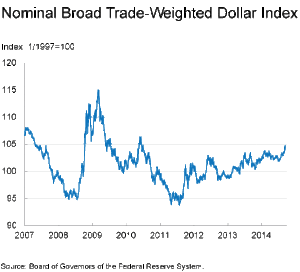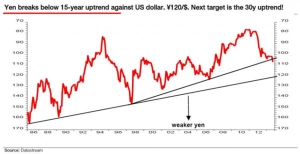“Money often costs too much.” Ralph Waldo Emerson
It really does all come down to money.
Money decides the outcome of wars and elections. It ensures that we are properly fed and clothed. It buys us an education and pays for all of our material needs. And it may not be able to buy happiness, but it does have a dramatic impact on that vague thing that’s often referred to as “quality of life.”
All of us, if we’re being honest, would rather have more of it than less of it.
But the value of money is variable. The currency of one country continuously fluctuates in value relative to the currency of every other country – and those fluctuations can have a dramatic economic impact.
A Stronger Dollar
You’d think countries would be striving to make their currencies stronger, but in recent years, we’ve had “currency wars” as competing countries have tried to weaken their currencies to increase demand for their imported goods.
 The United States has criticized China for its currency manipulation, but in the meantime, the Federal Reserve Board’s easy money policies have deliberately weakened the dollar.
The United States has criticized China for its currency manipulation, but in the meantime, the Federal Reserve Board’s easy money policies have deliberately weakened the dollar.
Now, though, as other countries’ currencies have become weaker, the dollar has strengthened. In fact, the dollar reached a four-year high this week against a basket of major currencies, as The Wall Street Journal reported, “amid mounting expectations the Federal Reserve will raise interest rates next year while its counterparts in Europe and Japan consider further measures to raise inflation and spur growth.”
FX Effects
As an example of the effects of fluctuating foreign exchange (FX) rates, consider what’s been happening to the Japanese yen and its potential impact on other countries.
Societe Generale strategist Albert Edwards calls the chart below, which shows the yen weakening against the dollar, “the key chart investors should be focusing on at present.” 
It’s understandable that the dollar has been strengthening as the Federal Reserve Board winds down its quantitative easing program, but the yen has also “broken key support levels against the euro,” as Zerohedge noted.
“ … if I am right and the yen runs sharply lower from here,” Edwards writes, “then this will spell real trouble for the global economy.”
Why?
“First, because the Chinese economy will see a further rise in its already strong real exchange rate, especially if other Asian currencies are pulled down with the sliding yen. This will hurt the Chinese economy which, from August data, appears to be weakening again. …
“Second, a weak yen spells trouble for the west as a wave of deflation washes in from the rapidly devaluing east. This reverses a decade long trend. I believe that profits growth is so anemic in the west that this monetary tightening via strengthening exchange rates could in itself be sufficient to send US and European profits into outright decline and subsequently their economies into recession (via a contraction in the investment spending). That is why this FX technical break is so important.”
As Edwards concludes, “The next phase of global currency wars may have begun.”
More Special FX
Meanwhile, in China, faked documents for FX loans have resulted in uncovering at least $10 billion in fake trade.
Zerohedge notes that “one of the key uses of monetary commodities in China is for purposes of ‘trade,’ and especially to artificially boost exports by way of fake trade invoicing. Non-existent exports which, it goes without saying, end up boosting China’s already slumping GDP.”
The fake trades, which took place nationwide, but especially in the port of Qingdao, have “increased pressure from hot money inflows and provided an illegal channel for criminals to move funds,” according to Wu Rullin, a deputy head of the State Administration of Foreign Exchange’s inspection department.
“But while the end impact of the crackdown is still to be determined, one thing is clear: $10 billion is just the start,” Zerohedge concluded.
“The crackdown on fake trades could have an impact on the broader FX loan space,” Zerohedge reported, “which at last check was a whopping $1 trillion, and whose unwind would generate a wholesale market and bank crash in China, and perhaps serve as the catalyst to start China’s outright QE.”
BoJ’s Market Manipulation
Manipulation of currencies and manipulation of stock markets appear to be increasingly common.
Just as the Federal Reserve Board has propped up the U.S. stock market for years with its quantitative easing program, the Bank of Japan is manipulating the Japanese market with record purchases of equities.
The greatest influence for Japanese Prime Minister Shinzo Abe’s “Abenomics” appears to be former Fed Chair Ben Bernanke.
As Zerohedge noted, “Bank of Japan bought a record JPY 123.6 billion worth of ETFs in August. The market ‘knows’ that the BoJ tends to buy JPY10-20 billion ETFs when stock prices fall in the morning. The BoJ now holds 1.5% of the entire Japanese equity market cap (or roughly JPY 480 trillion worth) and is set to surpass Nippon Life as the largest individual holder of Japanese stocks.
“The central bank bought 123.6 billion yen worth of ETFs in August, the largest monthly tally so far this year. At one point, it snapped up ETFs in six straight sessions amid weak stock prices.”
In addition, pension reform in Japan will result in additional investment in the Japanese market.
As Zerohedge notes, “The farce is almost complete as the Japanese Ponzi teeters on the brink.”
